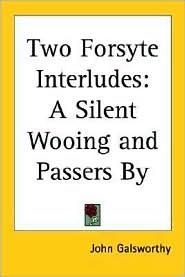
Part of Series
In 1930 Galsworthy published On Forsyte 'Change which deals in the main with the older Forsytes before the events chronicled in The Man of Property. Galsworthy states in a foreword that "They have all been written since Swan Song was finished but in place they come between the Saga and the Comedy…" By way of explanation he says that "It is hard to part suddenly and finally from those with whom one has lived so long; and these footnotes do really, I think, help to fill in and round out the chronicles of the Forsyte family". Contents: The Buckles of Superior Dosset, 1821-1863 Sands of Time, 1821-1863 Hester's Little Tour, 1845 Timothy's Narrow Squeak, 1851 Aunt Juley's Courtship, 1855 Nicholas Rex, 1864 A Sad Affair, 1867 Revolt at Roger's, 1870 June's First Lame Duck, 1876 Dog at Timothy's, 1878 Midsummer Madness, 1880 The Hondekoeter, 1880 Cry of Peacock, 1883 Francie's Fourpenny Foreigner, 1888 Four-In-Hand Forsyte, 1890 The Sorrows of Tweetyman, 1895 The Dromios, 1900 A Forsyte Encounters the People, 1917 Soames and the Flag, 1914-1918
Author

Literary career of English novelist and playwright John Galsworthy, who used John Sinjohn as a pseudonym, spanned the Victorian, Edwardian and Georgian eras. In addition to his prolific literary status, Galsworthy was also a renowned social activist. He was an outspoken advocate for the women's suffrage movement, prison reform and animal rights. Galsworthy was the president of PEN, an organization that sought to promote international cooperation through literature. John Galsworthy was awarded the Nobel Prize in literature in 1932 "for his distinguished art of narration which takes its highest form in The Forsyte Saga."





